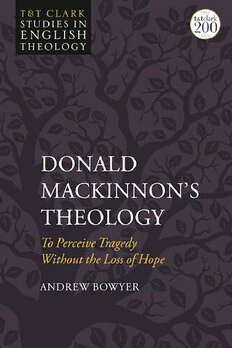
Donald MacKinnon’s Theology: To Perceive Tragedy Without the Loss of Hope PDF
219 Pages·2019·2.707 MB·English
Most books are stored in the elastic cloud where traffic is expensive. For this reason, we have a limit on daily download.
Preview Donald MacKinnon’s Theology: To Perceive Tragedy Without the Loss of Hope
Description:
Donald MacKinnon (1913-1994) was one of the most influential Anglican theologians in the aftermath of World War Two. His writings reveal him as a restive and unsystematic thinker, yet there is a good case to be made that a series of reoccurring questions – ‘obsessions’ might better honour the memory of MacKinnon’s temperament –appear throughout. These relate to the demands of moral realism, the tensions between the philosophical positions of realism and idealism, and the perennially disruptive presence of Christ.Andrew Bowyer outlines McKinnon’s contribution and context, as well as characterising his work as a form of “therapeutic” moral philosophy that combines a call for intense self-awareness together with a commitment to realist notions of moral “factuality”. Bowyer examines the key influences on McKinnon’s thought, his focus on Christology, his engagement with literature and literary criticism, as well as his response to Wittgenstein’s later philosophy. This volume offers an appreciation of his contribution and a critique of his legacy.
See more
The list of books you might like
Most books are stored in the elastic cloud where traffic is expensive. For this reason, we have a limit on daily download.
